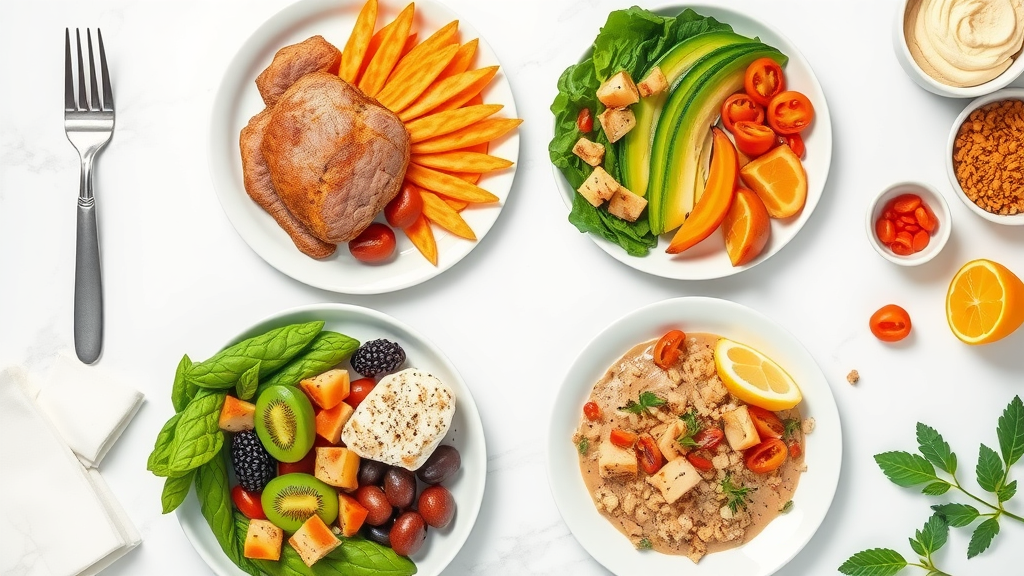Did you know a recent global study found that people following plant-based diets tend to have a lower body mass index than those who consume animal products? With mounting interest in healthy weight loss and the potential health benefits of vegan diets, it’s no wonder more people are asking, “Will vegan meals help me to lose weight?” In this comprehensive guide, we’ll explore what the science truly says about vegan diets, weight management, and how you can harness the power of plant foods for lasting change—whether you’re new to vegan eating or want to optimize your results.
A Surprising Look at Vegan Meals and Weight Loss: Shedding Light with Science
When it comes to losing weight , many individuals are turning their attention to the vegan diet . But does swapping out animal products for plant-based options really move the scale? Scientific research consistently reveals that those who adopt vegan or plant-based diets tend to achieve lower body weight and have lower risks for chronic disease . The reason? Whole plant foods are generally low in calorie density , high in fiber, and brimming with nutrients that keep you full for longer without adding as much to your caloric intake.
For example, a clinical trial published in a leading medical journal showed that switching from a diet heavy in animal products to one focused on whole grains, legumes, fruits, and vegetables resulted in more weight loss compared to those on a standard Western diet, even with similar levels of physical activity. These findings aren’t just theoretical; people who commit to vegan meals, especially when prioritizing minimally processed foods , often report steady progress in their weight management journey and improvements in their overall health.

"A recent global study found that people following plant-based diets tend to have a lower average body mass index compared to omnivores."
How Will Vegan Meals Help Me to Lose Weight? Understanding the Fundamentals
If you’re asking, “How will vegan meals help me to lose weight?” , start by understanding the core principles behind this dietary shift. At the heart of weight loss lies the concept of calorie intake versus calories burned. The vegan diet, naturally low in saturated fat and often low in calorie density , encourages the consumption of fiber-rich foods —think beans, lentils, whole grains, and vegetables—that keep you fuller, longer. This can help you achieve a healthy weight by signaling natural satiety before you’ve consumed excess calories.
Moreover, the way macronutrients —proteins, carbohydrates, and fats—are distributed in plant-based meals supports steady energy levels and satisfaction. Vegan diets also replace high-calorie animal products and dairy products with foods low in calories but high in volume, allowing for larger, more satisfying portions. Choosing whole plant foods over processed options is key for promoting weight management, as these tend to be naturally filling without excessive caloric intake or added sugars.
- Calorie intake: Plant-based meals are often lower in calories per volume compared to omnivorous meals
- Macronutrient distribution in vegan diets: Emphasize complex carbs, plant-based proteins, and healthy fats
- Satiety: High fiber content keeps you full and minimizes overeating
- Fiber-rich diets play a crucial role in controlling hunger and supporting digestive health
For those interested in practical meal planning, exploring a variety of nutritious options can make the transition to plant-based eating both enjoyable and sustainable. If you’re looking for inspiration beyond vegan meals, you might find value in this delicious gluten-free meal plan to inspire your week , which offers creative ideas for balanced, health-focused eating.
What You’ll Gain: Insights from Will Vegan Meals Help Me to Lose Weight
- Discover the latest scientific findings about the relationship between vegan diet and weight loss
- Uncover practical weight management strategies recommended by top nutrition experts
- Gain actionable tips for creating satisfying, balanced vegan meals for healthy and sustainable results
The Science Behind Vegan Diets and Weight Loss
Why Vegan Diets Often Lead to Weight Loss
Numerous large-scale studies and clinical trials indicate that vegan diets frequently promote weight loss. The reasons are multifactorial: vegan meals are typically low in calories yet high in fiber, leading to less overall energy consumption and more consistent satiety signals. Plant foods are also naturally water-rich, providing greater food volume for each calorie consumed. This aspect is crucial for achieving a healthy weight without the feeling of deprivation commonly seen in other weight loss regimens.
Another contributing factor is that vegan diets often reduce the intake of saturated fat found in animal products, which is strongly associated with weight gain and cardiovascular disease. Shifting the caloric intake balance toward plant-based options, especially those rich in fiber and nutrient-dense, makes it easier to cut overall calories without radically altering how much you eat. This approach is sustainable and easier to maintain over time, especially when paired with regular physical activity .
"Research shows that vegan diets may naturally lower calorie intake and increase satiety, which can support sustainable weight loss efforts."
Plant-Based Diets vs. Omnivorous Diets: Weight Loss Effects
When comparing plant-based diets to omnivorous diets, the trend is clear: people on vegan diets tend to have lower body weight and a lower average mass index than those who consume animal products. Controlled studies reveal that even when participants have similar access to exercise and caloric intake is tracked, those who cut out animal products lose more weight. Why? It’s due to the unique properties of plant foods—lower calorie density, higher fiber, and more volume per serving—which result in greater fullness and fewer opportunities for mindless snacking or overeating.
But it’s not just about losing weight. Clinical trials show that switching to a vegan diet can also improve metabolic markers, such as cholesterol, blood pressure, and blood sugar control. This makes plant-based eating an excellent strategy for weight loss and overall health, outperforming the typical Western diet.
| Diet Type | Average Weight Lost (12 weeks) | Average Calorie Intake (per day) | Adherence Rate | Improvement in Metabolic Markers |
|---|---|---|---|---|
| Vegan Diet | 6-8 lbs | 1500–1700 kcal | 82% | Lower cholesterol, improved blood pressure, better insulin sensitivity |
| Omnivorous Diet | 3-5 lbs | 1800–2100 kcal | 73% | Minor improvements; less pronounced changes |

Understanding Calorie Intake while Losing Weight on a Vegan Diet
The foundation of any effective weight loss plan is managing total calorie intake . With a vegan diet , this is often easier, because plant-based foods are typically low in calories but high in essential nutrients and fiber. Studies show that those following vegan diets naturally consume fewer calories daily, thanks to foods like legumes, whole grains, fruits, and vegetables that bulk up meals and keep hunger at bay.
Understanding your unique caloric needs and choosing the right mix of whole, unprocessed vegan foods helps support sustainable weight loss and minimizes the likelihood of weight gain . Monitoring portion sizes, staying mindful of high-calorie vegan treats, and making room for healthy fats and proteins all contribute to a balanced approach to eating and long-term weight management success.
How Vegan Meals Affect Calorie Intake
Eating vegan meals impacts calorie intake by emphasizing foods that are naturally low in calorie density but rich in fiber and water content. For example, a large salad with beans and vegetables will fill you up more—and with fewer calories—than an equal portion of steak and potatoes. This volume-based approach means you can eat satisfying meals while still enjoying a caloric deficit necessary for weight loss. The high-fiber content of whole plant foods also slows digestive processes, extending feelings of fullness and reducing temptation to snack.
- Lower calorie density: Leafy greens, fruits, and whole grains fill the plate without excess calories
- High fiber provides more satiety and naturally limits overeating
- Natural portion control: It’s easier to eat controlled portions of whole foods than processed snacks
Macronutrients in Vegan Meals and Their Impact on Weight Loss
Building a healthy vegan plate means understanding the role of macronutrients —proteins, carbohydrates, and fats—in supporting weight loss . Protein from plants (think lentils, beans, tofu, tempeh) is critical for retaining muscle and promoting satiety as you lose weight. Complex carbohydrates like brown rice, sweet potatoes, and oats provide lasting energy and limit spikes in blood sugar that contribute to cravings. Healthy fats from avocados, nuts, seeds, and olive oil deliver essential nutrients for brain function, hormone balance, and sustained satisfaction with your meals.

- Protein: Beans, lentils, tofu, tempeh, and edamame
- Carbohydrates: Whole grains, starchy vegetables, fruits, and legumes
- Healthy fats: Avocado, nuts, seeds, olives, and coconut
What Science Says About Healthy Weight and Vegan Diets
Extensive research from multiple clinical trials shows those following plant-based diets are more likely to achieve and sustain a healthy weight than individuals on a standard Western or omnivorous diet. The mechanisms go beyond calorie counting: high fiber intake improves gut health and regulates digestion, while a reduction in saturated fat from cutting animal products supports cardiovascular health and metabolic efficiency.
Large population cohort studies indicate that individuals adhering to vegan diets not only maintain a lower body mass but also benefit from improved metabolic markers and reduced risk for conditions like heart disease , hypertension, and type 2 diabetes. The combination of fewer processed foods, more nutrient-dense meals, and better control of appetite all contribute to lasting wellness.
"Those following plant-based diets have been shown to maintain a healthy weight more easily than those on standard Western diets, according to several large cohort studies."
Creating Long-Term Success: Balancing Vegan Meals and Physical Activity

Maintaining weight loss goes beyond just healthy eating; incorporating regular physical activity is vital for optimal results. Exercise boosts metabolism, preserves lean muscle, and enhances mood—all of which support the choices you make in your vegan diet. Whether it’s brisk walking, cycling, yoga, or strength training, combining movement with plant-based meals creates a powerful synergy for weight management and overall vitality.
Nutrition experts advise starting at your own pace and making gradual adjustments. Pair protein-rich vegan meals with consistent workouts to maximize muscle maintenance and body fat loss. Remember, both diet and exercise are integral to a well-rounded approach to long-term health and weight loss .
The Role of Physical Activity Alongside Vegan Diets
- Choose activities you enjoy—walking, running, cycling, or dance—so you stay motivated
- Combine plant-based eating with strength training to support muscle growth and fat reduction
- Rest and recovery are just as important as movement; be sure to support your body with adequate sleep and hydration
Health Benefits Beyond Weight Loss: Exploring Vegan Diets

While the focus here is weight management, the health benefits of vegan diets reach much further. Research has linked plant-based eating with reduced risk for chronic diseases such as heart disease, cancer, and type 2 diabetes. Vegan diets have been associated with lower cholesterol, improved insulin sensitivity, and better gut health due to their naturally high fiber and prebiotic content.
Many experience improved digestion, increased energy levels, and more stable blood sugar on plant-based diets. The removal of high-fat animal and dairy products also leads to lower intake of substances known to promote inflammation and arterial plaque formation, making plant-based eating an investment in both short-term results and longer-term wellness.
- Reduced risk of chronic diseases (e.g., heart disease, certain cancers, type 2 diabetes)
- Better gut and digestive health
- Lower cholesterol levels and improved blood sugar control
- More energy and improved mood as part of an overall healthy lifestyle
Common Questions About Will Vegan Meals Help Me to Lose Weight
Can you lose weight eating vegan food?
- Yes, many people experience weight loss on vegan diets due to naturally lower calorie intake , increased fiber, and better satiety from whole plant foods. A focus on minimally processed vegan meals is most effective for lasting results.
What is the 30 30 30 rule for weight loss?
- The 30 30 30 rule advises consuming 30 grams of protein within 30 minutes of waking and following that with 30 minutes of exercise. This method can be adapted for vegan diets using plant-based protein sources for weight loss and muscle support.
Is there a downside to a vegan diet?
- Potential downsides include nutrient gaps (such as vitamin B12, iron, and omega-3 fatty acids) if the diet is not carefully planned. Overcome these challenges by incorporating fortified foods, supplements, and diverse plant foods for nutritional balance.
What happens to your body when you first go vegan?
- Individuals transitioning to a vegan diet often report increased energy and possible weight loss. Early effects may include improved digestion and changes in the gut microbiome due to higher fiber intake. Some notice improved mental clarity and overall wellness within weeks.
How to Achieve Healthy Weight Loss with Vegan Meals: Actionable Tips
- Plan balanced, whole-food vegan meals focusing on a variety of vegetables, grains, and legumes
- Track your calorie intake in the initial stages to identify eating patterns
- Incorporate regular physical activity suited to your ability and schedule
- Prioritize high-protein vegan foods like tofu, lentils, and tempeh for satiety and muscle preservation
- Stay hydrated, and monitor key nutrients (B12, iron, omega-3) to avoid deficiencies
Expert Voices: What Nutritionists Say About Will Vegan Meals Help Me to Lose Weight
"Many of my clients have found that focusing on whole plant foods allows them to lose weight without feeling deprived or hungry." – Registered Dietitian
Practical Sample Menu: Vegan Meals for Weight Loss

| Meal | Menu Example | Approx Calories |
|---|---|---|
| Breakfast | Oatmeal with berries, chia seeds, and almond milk | 300 |
| Snack | Apple with peanut butter | 150 |
| Lunch | Quinoa salad with chickpeas, mixed greens, and avocado | 400 |
| Snack | Carrot sticks and hummus | 120 |
| Dinner | Lentil and vegetable stir-fry with brown rice | 500 |
Real-Life Success Stories: Vegan Diets and Weight Loss
"Switching to a vegan diet helped me lose 25 pounds and keep it off—plus I feel more energetic every day."

Countless individuals attribute transformative results to embracing vegan meals—not just for their weight loss, but also for their renewed confidence and health. These stories are echoed in support groups, online forums, and nutritionist offices worldwide, where people share how switching to a whole-food, plant-based diet helped them shed unwanted body fat, feel vibrant, and make sustainable changes that last for years.
Whether you're looking to lose a few pounds or much more, the common thread in these stories is that vegan diets prove especially effective when coupled with balanced meals, regular physical activity, and mindful eating habits . These strategies empower individuals to not just reach a healthy weight, but also enjoy a lifetime of good nutrition and wellness.
Achieving Healthy Weight and Long-Term Wellness with Vegan Meals
Maintaining Weight Loss on a Vegan Diet
- Focus on minimally processed foods to prevent unwanted weight gain
- Monitor your weight regularly to spot potential plateaus or setbacks early
- Adapt your calorie and macronutrient intake as activity level changes to preserve a healthy balance
Summary: Will Vegan Meals Help Me to Lose Weight According to Science?
- Extensive scientific evidence demonstrates that plant-based, vegan diets can effectively promote weight loss and support a healthy body weight
- Individual results depend on food choices, portion control, and overall lifestyle factors—including regular exercise
- Proper planning ensures you meet nutrient needs and maintain weight loss for the long term
FAQs on Will Vegan Meals Help Me to Lose Weight
- Are vegan meals lower in calories than omnivorous meals? Most whole-food vegan meals are lower in calorie density, promoting fullness and weight loss without excessive calorie intake.
- Can you combine vegan meals with other weight-loss diets? Yes, vegan diets can be integrated with other approaches (like intermittent fasting or calorie tracking) for enhanced results and variety.
Learn More About Achieving Weight Loss with Vegan Meals
- Download free meal planners, evidence-based vegan nutrition guides, and trusted resources to help you get started on your journey today.
Watch inspiring before-and-after stories, meet expert nutritionists, and see quick meal preparation tips that showcase the power of vegan diets for healthy weight loss.
How to Start Your Vegan Weight Loss Journey Today
- Explore links to expert resources, claim your free consultation with a plant-based nutrition coach, and access tools for achieving sustainable healthy weight loss with vegan meals.
Take action: Start planning your next plant-based meal, set a realistic goal, and join a supportive community—your journey to a healthier, leaner you begins with your next choice!
As you continue your journey toward a healthier lifestyle, consider broadening your approach with holistic wellness strategies. For those seeking to enhance vitality and well-being after 45, these healthy lifestyle tips for a vibrant future offer expert guidance on nutrition, movement, and daily habits. Exploring these insights can help you build a foundation for long-term health, complementing your plant-based weight loss goals with proven strategies for lifelong wellness.
Scientific research indicates that adopting a vegan diet can be an effective strategy for weight loss. A systematic review and meta-analysis of randomized controlled trials found that individuals following vegan diets experienced significant reductions in body weight and body mass index (BMI) compared to those on other diets. Specifically, the study reported an average weight loss of 4.1 kg and a BMI decrease of 1.38 kg/m² over a period of 12 to 26 weeks. ( pubmed.ncbi.nlm.nih.gov )
Another randomized clinical trial demonstrated that a low-fat vegan diet led to significant weight loss and improved insulin sensitivity in overweight adults. Participants on the vegan diet lost an average of 5.8 kg over 16 weeks, compared to 3.8 kg in the control group. ( jamanetwork.com )
These findings suggest that incorporating vegan meals into your diet may aid in weight loss and improve metabolic health.
 Add Row
Add Row 

 Add
Add 


Write A Comment